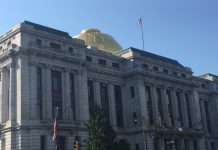By Matthew Brown
At 5 p.m. Monday afternoon, organizers from the People’s Organization for Progress, a grass-roots activist group, held the organization’s weekly Justice Monday event outside the Peter Rodino Federal Building in Newark. The organization has convened there more than 120 times since Feb. 1, 2016, the date that marks the anniversary of the historic Greensboro, N.C. sit-ins in 1960. By demonstrating, the group hopes to bring greater attention to New Jersey’s underreported cases of police brutality, specifically those of Kashad Ashford, Darryl Fuqua, Radazz Hearns, Abdul Kamal and Jerome Reid. Although each shooting underwent a preliminary investigation, there have been no subsequent civil rights investigations from the state or federal attorney generals’ offices.
This week, the group’s event also centered on the case of Michael Thomas Jr., a 10-year-old child who was handcuffed and pressed onto a police car’s hood by Chicago police this past week. “We try to link cases of police brutality in New Jersey to other incidents around the nation,” said Lawrence Hamm, the founder and chairman of P.O.P. “We always seek to draw attention to this issue, to show that this is a national problem, a national epidemic of police brutality, of police killings, a violation of Americans’ constitutional rights.”
The P.O.P often also advocates for individuals in need of community assistance. Continuing this tradition, members of P.O.P will attend the court hearing of Sean Reid, the brother of the deceased Jerome Reid, Friday, June 15, at 9 a.m.
Reid has been accused of attempted murder, robbery and possession of a weapon by a neighbor, despite presenting an alibi to the contrary.
“He was at work in Jersey City at the time of the incident,” said Sheila Reid, mother of Sean and Jerome Reid and a four-year member of P.O.P. “We have confirmation from his boss.”
The court determined that the evidence presented by the Reid family was insufficient for dismissal, allowing the hearing to proceed. The family now hopes that their case presented this Friday, combined with high community attendance, will persuade the court in Reid’s favor. “This is my second child, my first child was shot, his hands were down,” said Sheila Reid. “I couldn’t help Jerome in life, but I can get him justice in death, and I’m not going to lose another one, not on a bogus charge.” She has been active in P.O.P. since her eldest son’s fatal shooting by police.
Although much of the organization’s recent activism has centered on issues of police brutality and criminal justice, the group engages with numerous progressive issues. “At some point in the past 35 years, we have advocated for every social, economic and political issue impacting our communities,” stated Hamm.
Members of the P.O.P have held voter registration drives in downtown Newark since early March, and intend to continue registering the city’s residents until the registration deadline. Saturday, June 23, P.O.P will also host a march and rally for reparations at the Lincoln Monument across from Essex County College in Newark. “It was a hot topic issue for a moment but then got lost, and we want it to make a return to prominence,” said Hamm of reparations.
The Organization has held an event in support of reparations annually for the past decade, and included the provision of reparations as a goal in its previous Campaign for Jobs, Peace and Equality. Hamm stated that the organization supports Representative Sheila Jackson Lee’s (D-Texas) House Resolution 40, which would establish a commission to “study and develop reparation proposals for African-Americans to examine slavery and discrimination in the colonies and the United States from 1619 to the present and recommend appropriate remedies.”
The Organization also wishes for the New Jersey Legislature to pass measures mirroring H.R 40, with the goal of providing reparations to African-American communities at the state and federal level. “The government has given reparations to other groups in U.S. history,” stated Hamm, “so the time for asking for reparations [for African-Americans] in U.S. history is long overdue.”











